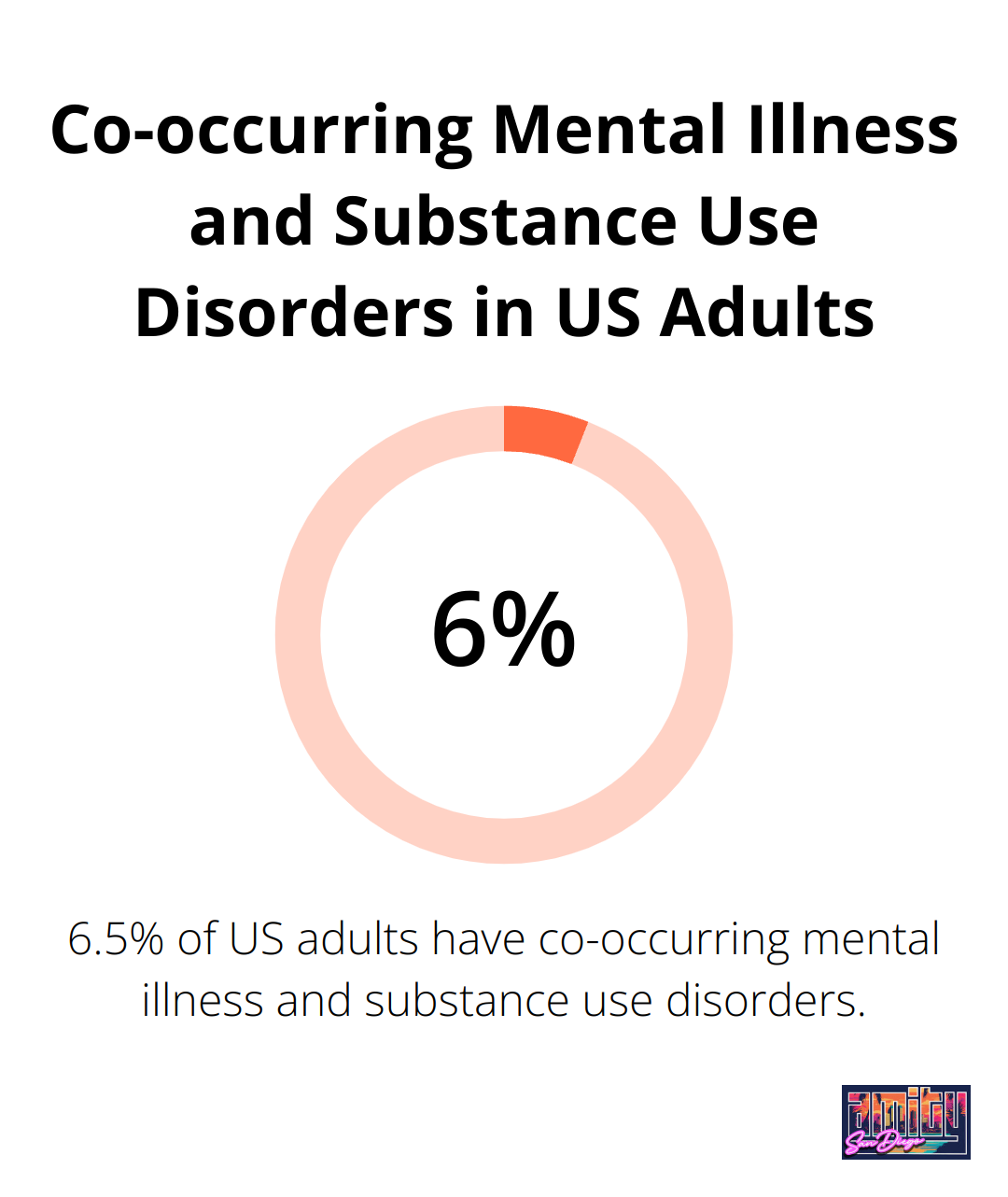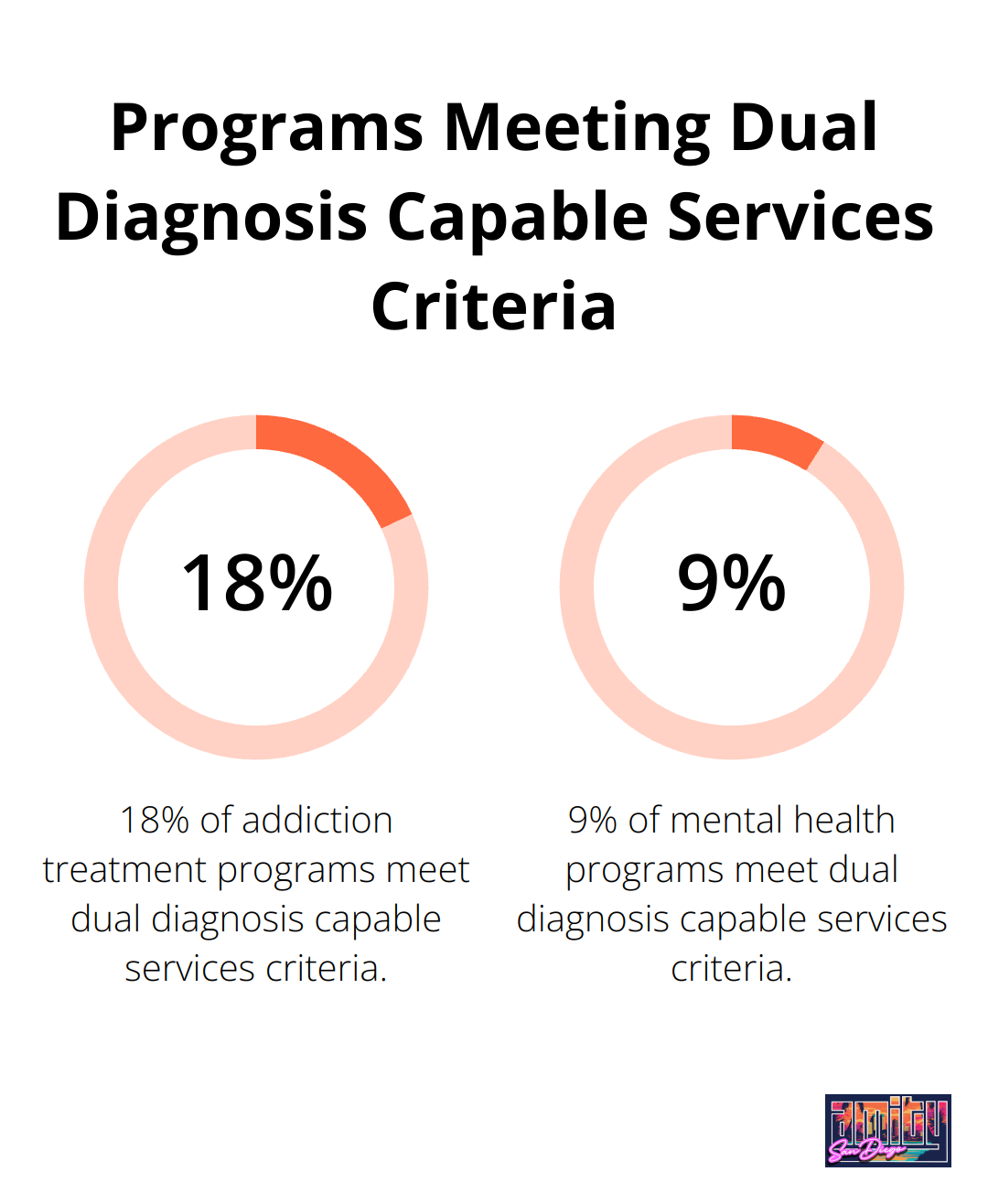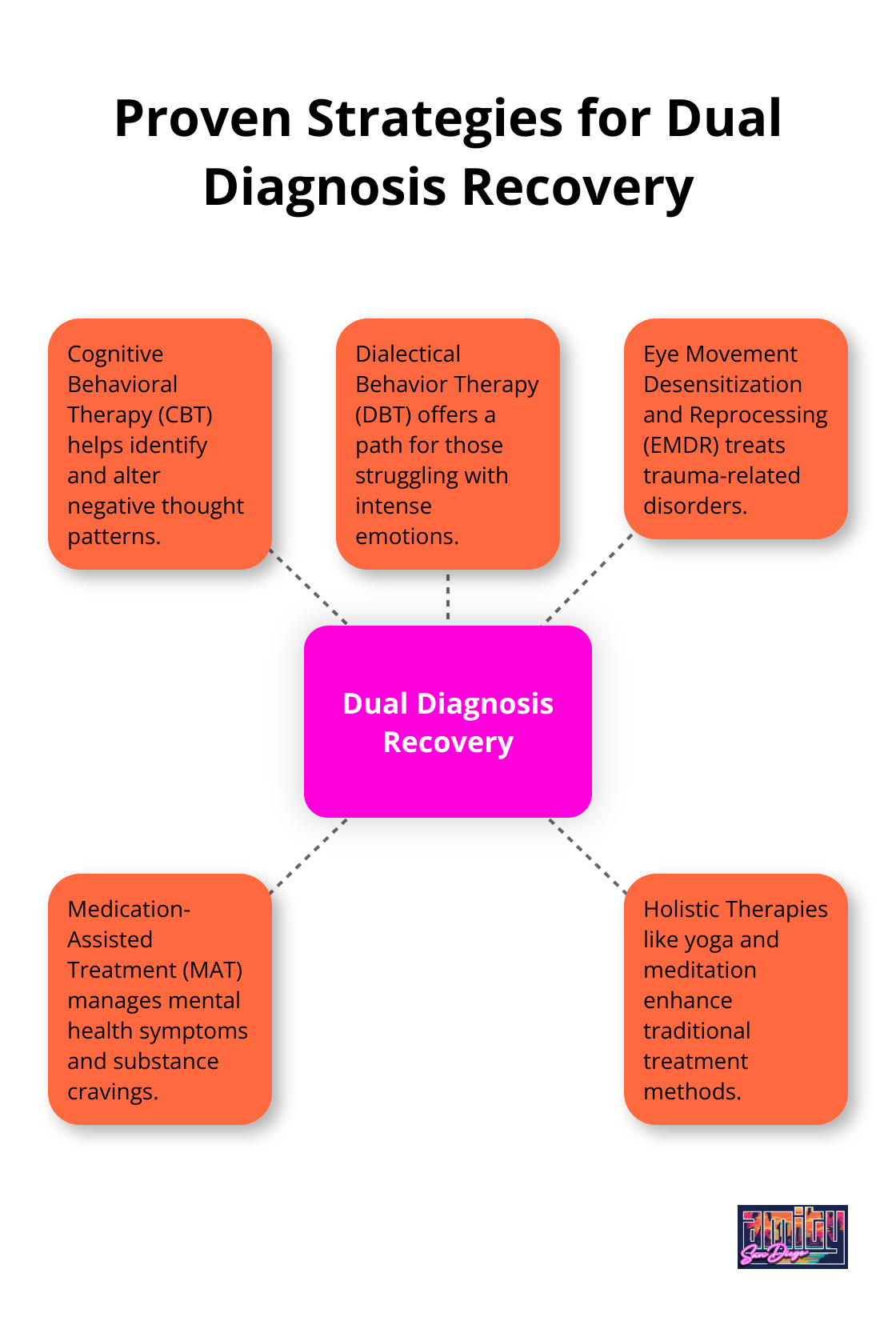At Amity San Diego, we’ve seen firsthand the complex challenges faced by individuals with co-occurring disorders.
Dual diagnosis, the presence of both a mental health condition and substance use disorder, requires a comprehensive approach to treatment.
Understanding the intricacies of dual diagnosis is crucial for effective recovery and long-term wellness.
In this post, we’ll explore the importance of integrated care and the most effective strategies for addressing co-occurring needs.
Understanding Dual Diagnosis: The Intersection of Mental Health and Addiction
Defining Dual Diagnosis
Dual diagnosis occurs when an individual experiences both a mental health disorder and a substance use disorder simultaneously. This complex condition affects millions of Americans and requires specialized treatment approaches.
The Interplay of Mental Health and Addiction
People with substance use disorders often have co-occurring mental disorders or other health conditions such as HIV. This high rate of co-occurrence isn’t coincidental. Mental health issues can lead to substance abuse as a form of self-medication, while substance abuse can exacerbate or even trigger mental health problems.
Common co-occurring disorders include:
- Depression with alcohol use disorder
- Anxiety with prescription drug abuse
- Post-traumatic stress disorder (PTSD) with opioid addiction
Each combination presents unique challenges and requires a tailored approach to treatment.
Prevalence in Addiction Treatment
According to SAMHSA’s 2022 National Survey on Drug Use and Health, approximately 21.5 million adults in the United States have a co-occurring mental illness and substance use disorder. This staggering number underscores the importance of integrated treatment approaches.

Many addiction treatment centers now recognize the need to address both conditions simultaneously for better outcomes. Treating only the addiction or only the mental health issue often results in incomplete recovery and a higher risk of relapse.
Recognizing Dual Diagnosis
Identifying dual diagnosis can challenge even experienced professionals because symptoms often overlap. For instance, the mood swings associated with bipolar disorder might be mistaken for the effects of substance use. This overlap necessitates comprehensive assessment by qualified professionals.
Some signs that might indicate a dual diagnosis include:
- Persistent mood changes not explained by substance use alone
- Using substances to cope with emotional pain or traumatic memories
- A history of mental health issues preceding substance abuse
- Difficulty maintaining sobriety despite mental health treatment
Early recognition and intervention play a key role in successful treatment. If you or someone you know shows signs of both mental health issues and substance abuse, seeking help from a facility equipped to handle dual diagnosis can make a significant difference in the recovery journey.
The Need for Specialized Care
Treatment for dual diagnosis requires a nuanced approach that addresses both the mental health and substance use aspects of an individual’s condition. Specialized facilities (like addiction treatment San Diego) offer integrated care that tackles these intertwined issues head-on, providing a more comprehensive path to recovery.
As we explore the importance of integrated treatment in the next section, we’ll uncover why addressing addiction and mental health simultaneously leads to more successful outcomes for those struggling with dual diagnosis.
Why Integrated Treatment Matters
The Challenge of Separate Treatment
Traditional approaches often treat mental health and addiction as separate issues. A study revealed that approximately 18% of addiction treatment and 9% of mental health programs met criteria for dual diagnosis capable services. This gap in care results in:
- Higher relapse rates
- Extended treatment durations
- Increased healthcare costs
- Worse overall health outcomes

The Power of Simultaneous Care
Integrated treatment recognizes the interconnected nature of mental health and substance use disorders. This approach:
- Reduces symptom severity for both conditions
- Improves treatment engagement and retention
- Enhances overall quality of life
Integrated treatment is effective in increasing the motivation for treatment amongst patients with anxiety and/or depression together with SUD in outpatient settings.
Personalized Approaches for Optimal Results
Integrated care allows for tailored treatment plans that consider each individual’s unique needs. This might include:
- Medication management addressing both conditions
- Therapy sessions exploring the relationship between mental health and substance use
- Holistic approaches supporting overall wellbeing
The Importance of Comprehensive Assessment
Effective integrated treatment starts with a thorough assessment. This process identifies:
- Specific mental health and substance use disorders present
- Severity and duration of each condition
- Underlying trauma or co-occurring medical issues (if any)
Screening and assessment are central to identifying and treating clients with cooccurring disorders (CODs) in a timely, effective manner.
The Role of Specialized Facilities
Treatment centers equipped to handle dual diagnosis (such as Amity San Diego) offer integrated care that tackles these intertwined issues head-on. These facilities provide a more comprehensive path to recovery, utilizing evidence-based practices and a multidisciplinary approach.
As we move forward, we’ll explore the specific therapies and treatment modalities that form the backbone of effective dual diagnosis care. These approaches combine the best of modern medicine and psychology to create a holistic healing experience.
Proven Strategies for Dual Diagnosis Recovery
At Amity San Diego, we witness the transformative power of the right therapy combinations. Our approach to dual diagnosis treatment rests on evidence-based practices, customized to each individual’s specific needs.

Cognitive Behavioral Therapy (CBT): A Cornerstone Approach
Cognitive Behavioral Therapy stands out in dual diagnosis treatment. CBT has demonstrated efficacy as both a monotherapy and as part of combination treatment strategies for substance use disorders. This therapy helps individuals identify and alter negative thought patterns, which leads to healthier behaviors and improved coping skills.
Dialectical Behavior Therapy (DBT) for Emotional Regulation
DBT offers a path forward for those who struggle with intense emotions alongside addiction. Research has found that DBT for Substance Abusers decreased substance abuse in patients with borderline personality disorder.
EMDR: Addressing Trauma at Its Core
Eye Movement Desensitization and Reprocessing (EMDR) therapy shows remarkable results in treating trauma-related disorders, which often underlie substance abuse. Studies have shown that EMDR was more effective than other trauma treatments in improving PTSD diagnosis and reducing symptoms, regardless of patients’ cultural backgrounds.
Medication-Assisted Treatment: A Balanced Approach
Medication-Assisted Treatment (MAT) plays a vital role in managing both mental health symptoms and substance cravings. We integrate MAT with counseling and behavioral therapies for a comprehensive recovery plan.
Holistic Therapies: Nurturing Mind, Body, and Spirit
Complementary therapies (such as yoga, meditation, and art therapy) enhance traditional treatment methods. Mindfulness-based interventions can be beneficial in treating individuals with dual diagnosis.
Final Thoughts
Dual diagnosis treatment marks a significant advancement in addiction care. It acknowledges the complex interplay between mental health and substance use disorders. Amity San Diego‘s integrated approach combines evidence-based therapies, medication management, and holistic practices to address the whole person.
The intricacies of dual diagnosis require specialized care from well-equipped facilities. Amity San Diego offers a comprehensive outpatient program tailored to individual needs. Our team of professionals provides personalized care plans that adapt to clients’ progress, ensuring continuous support throughout recovery.
If you or a loved one struggle with co-occurring disorders, help is available. Seeking comprehensive care is a brave step towards reclaiming your life. Contact Amity San Diego today to learn how our addiction treatment services can support your unique path to recovery.

